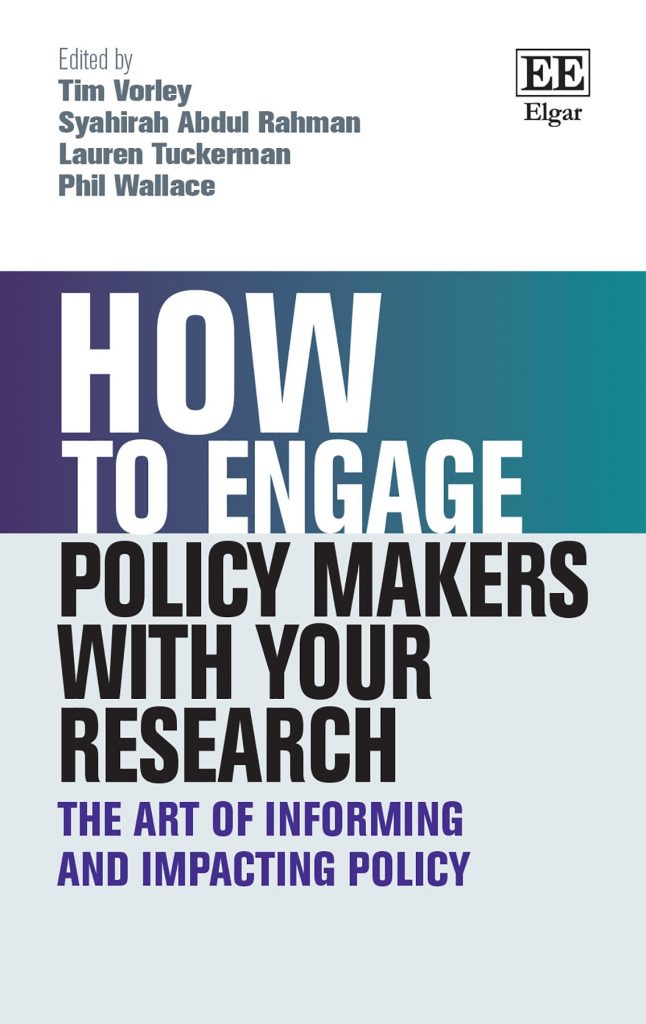
My favourite chapter in How to Engage Policy Makers with your Research (in addition to the one on Critical Friends which goes up tomorrow) was by Alice Owen, a prof at Leeds university, on ‘Supporting policy towards sustainability’. It’s a lovely reflection from a senior academic on the lessons she has learned in engaging with policy makers over the years. Some extracts and thoughts:
Choosing the right Language
‘The first rule of influencing policy makers towards sustainability is… do not mention sustainability… Think about how your understanding of sustainability matches the interests of the people you are trying to influence… Using simple metaphors such as ‘stop sawing through the branch we’re sitting on’ can be useful, rather than talking about climate change or resource scarcity, biodiversity loss, poverty alleviation of any one of the topics that lie within sustainability’.
Great practical advice based on looking through the eyes of those you are trying to influence, and trying to understand how you come across to them. Any decent advocate has to be able to bilocate – be in their own head, and that of the person they are talking to at the same time. Tricky but doable.

Assume Agreement
‘Once you have thought about and understood specific reasons why the policy maker could be interested in sustainability, assume that you have a shared goal and just need to work out what it is [her italics].
I have seen a lot of people who are passionate about sustainability, green economy and – more recently – the climate emergency, alienate the people who they want to bring onside by haranguing them with the dire state of the world and by proclaiming that every one of us has the responsibility to act. Such people campaign with sincerity, and while there is of course a truth in identifying the need for every single one of us to act, the truth is that very few people have the capability to change, certainly not in the radical way that some activists demand.’
Nothing to add. Spot on
The role of imagination
‘A powerful way to develop a shared goal is to imagine what is possible.’
Love this. If researchers/activists and policy makers find themselves stuck in some kind of entrenched/polarized zero sum game, try assuming that something is possible (in her example, that tidal power development could be sustainable for an estuary’s ecology) and work towards it.
Be helpful
‘There is much more appetite for helpfulness than there is for campaigning. Develop skills in translating, empathising, communicating, listening, encouraging: ask people what challenges they are dealing with, do not try to open a conversation with what you believe their problems are, unless that is what you have been asked. My experience is that it helps to be an authentic human being. You will struggle to live a fully sustainable life as much as anyone else, because layers of systems shaped by policy – infrastructure, spatial planning, economic management – will limit the changes you can make. Sustainability cannot be achieved through individual action alone. Being open and honest about the limitations on what it is possible to do can actually lend authority to your advice, because it starts from a place of pragmatism.’
Do not try to open a conversation with what you believe their problems are
All of this is good, but there are some obvious caveats. This is how insiders work – in this case researchers, but a lot of it applies to advocacy too. Their aim here is to get in the room with policy makers and influence them to make decisions in a particular direction. For that, you need to build relationships, understand incentives, have the emotional intelligence to see PoVO (Point of View of the Other) and the confidence to avoid finger wagging.
But there’s a role for outsiders too – the more angry, urgent, public protests that can build awareness and help open doors for those trying to play the role of insiders. The book didn’t really cover the role of research among outsider movements, but I think Oxfam’s paper on its experience of research for advocacy offers some useful additional tips.
Thoughts?